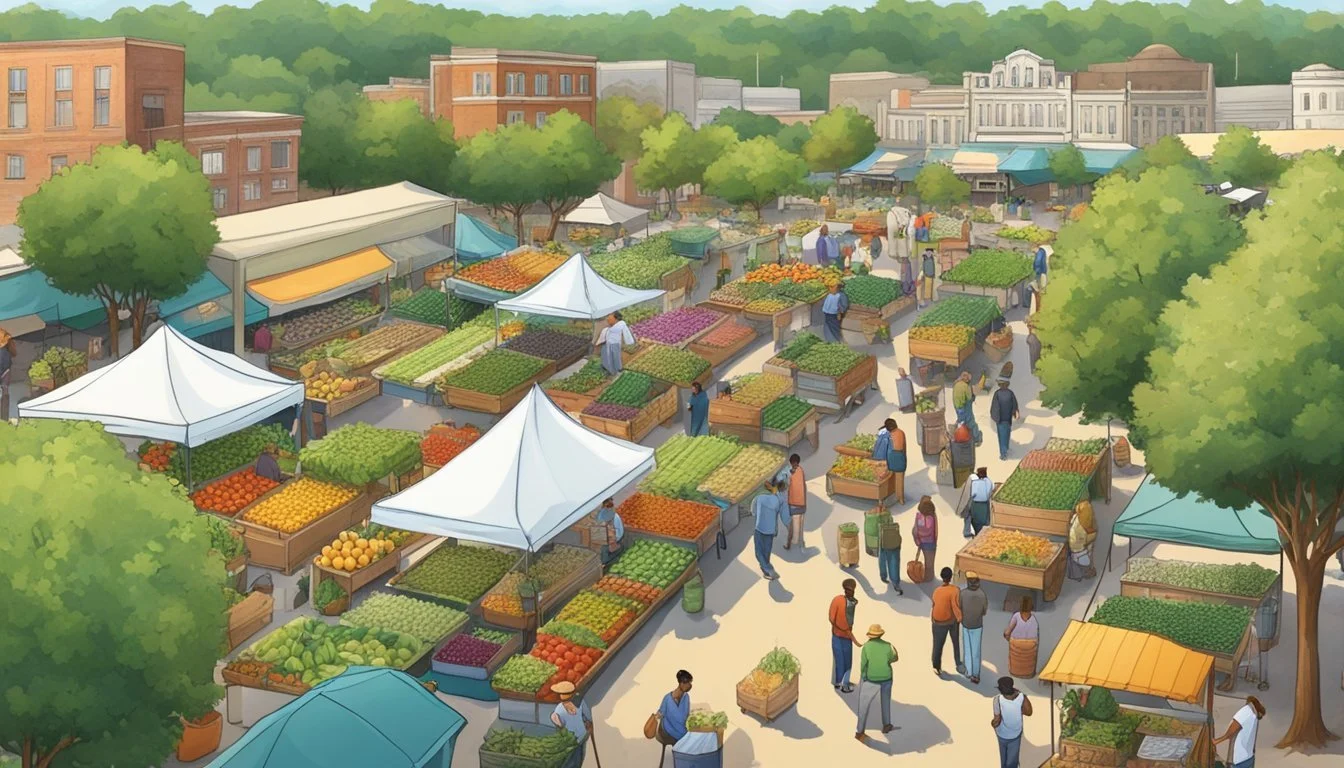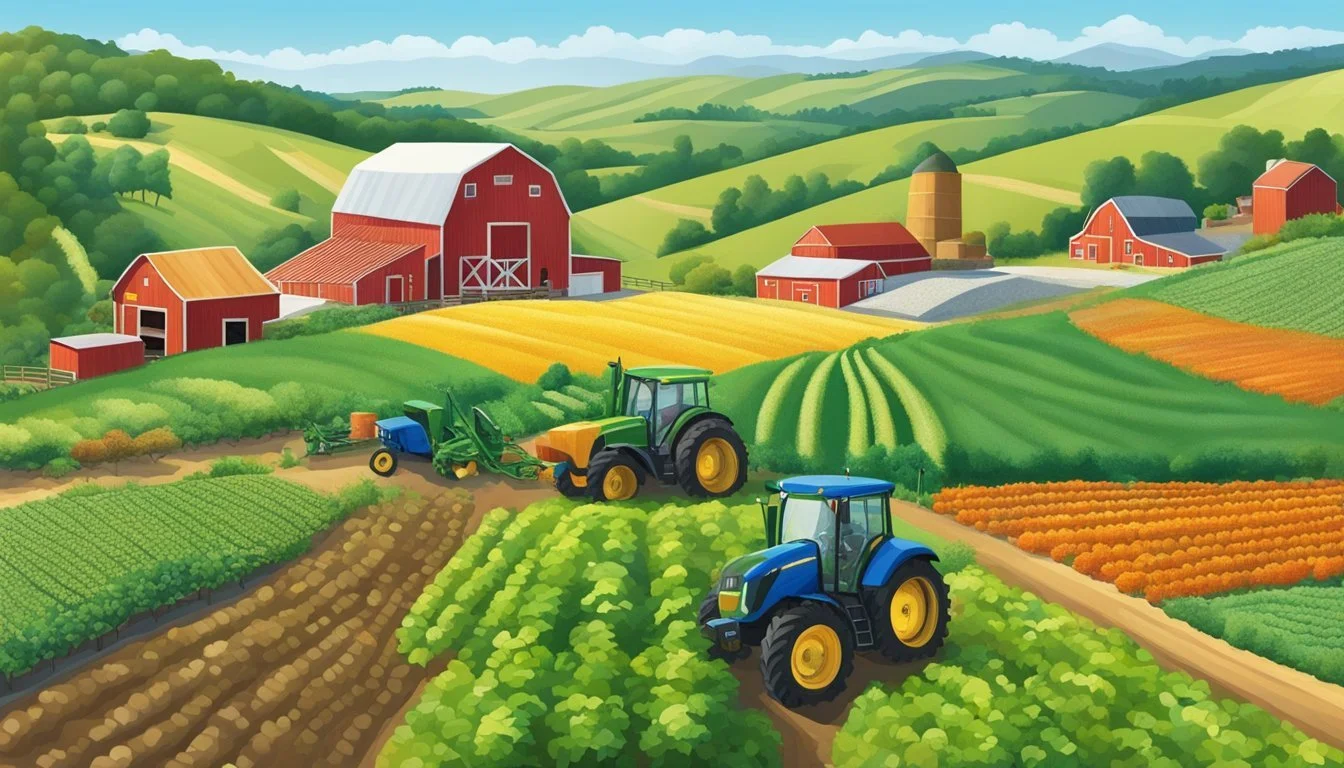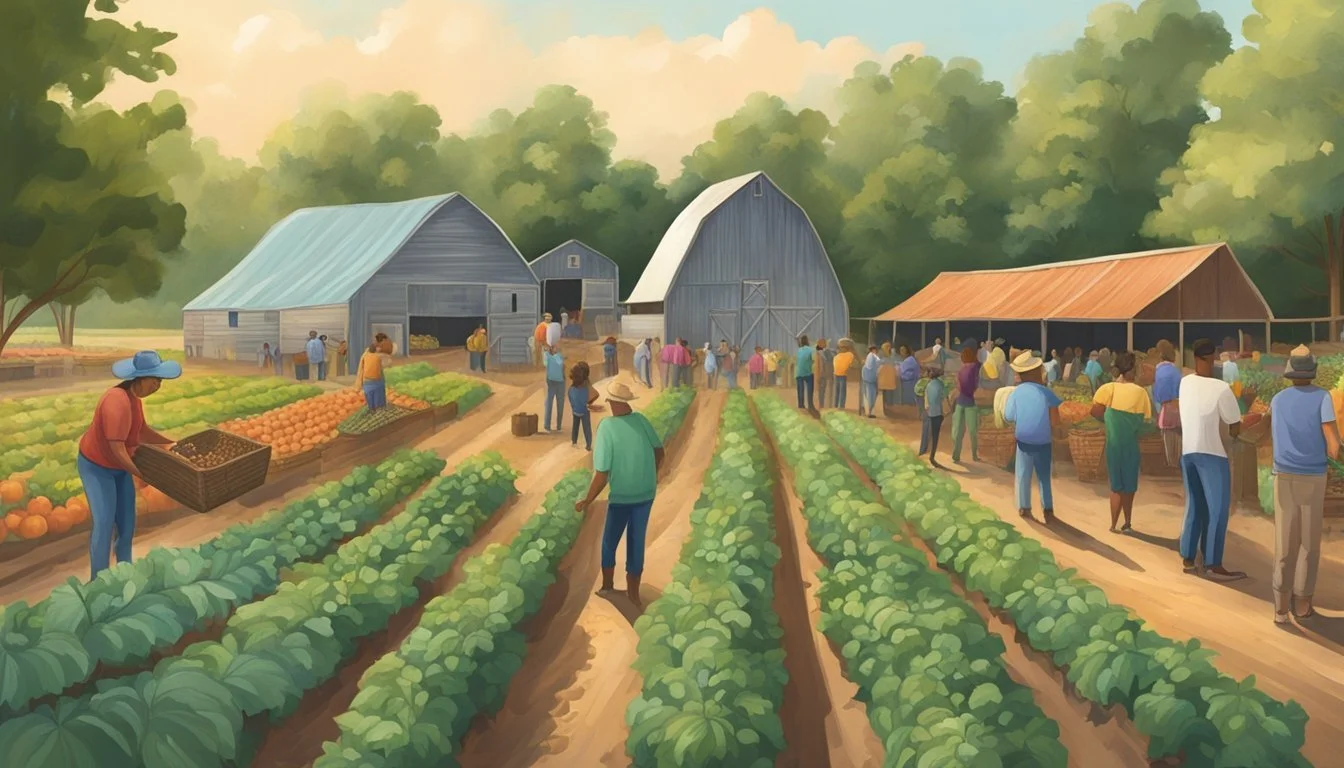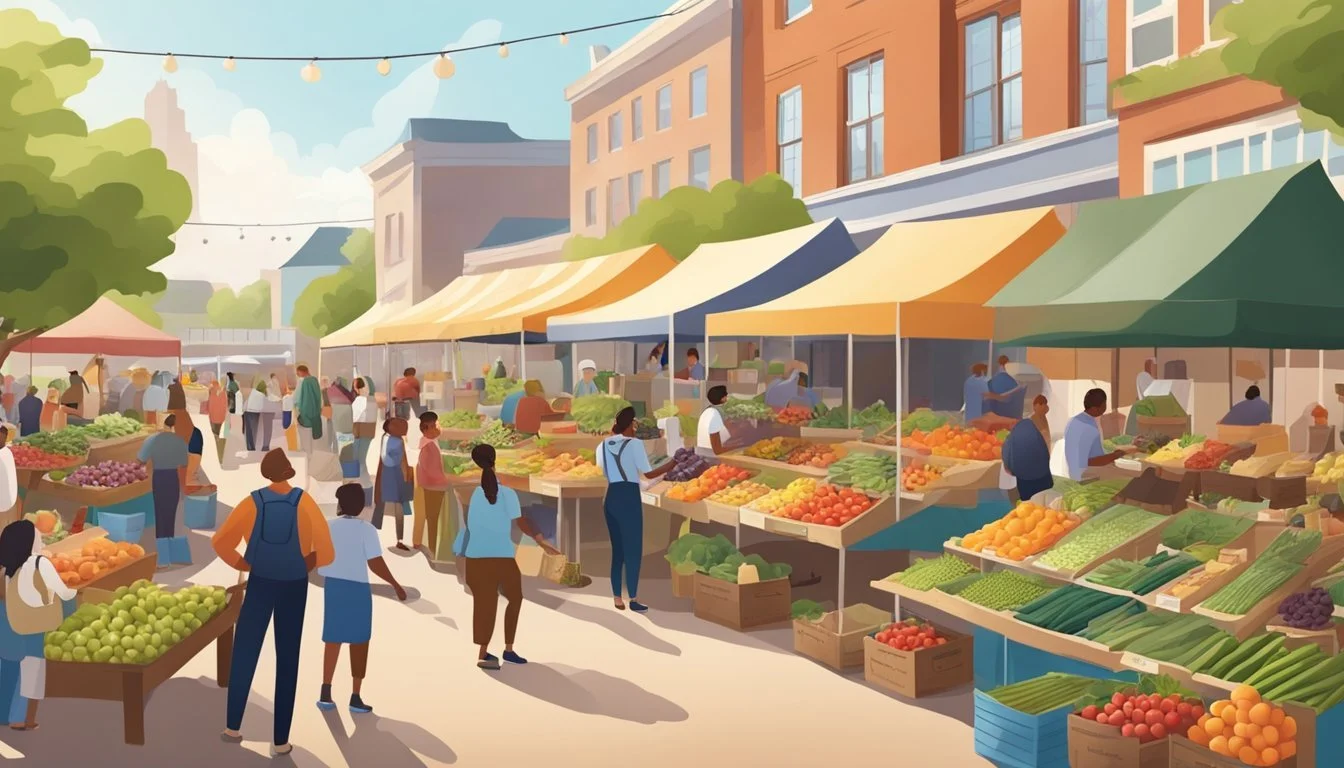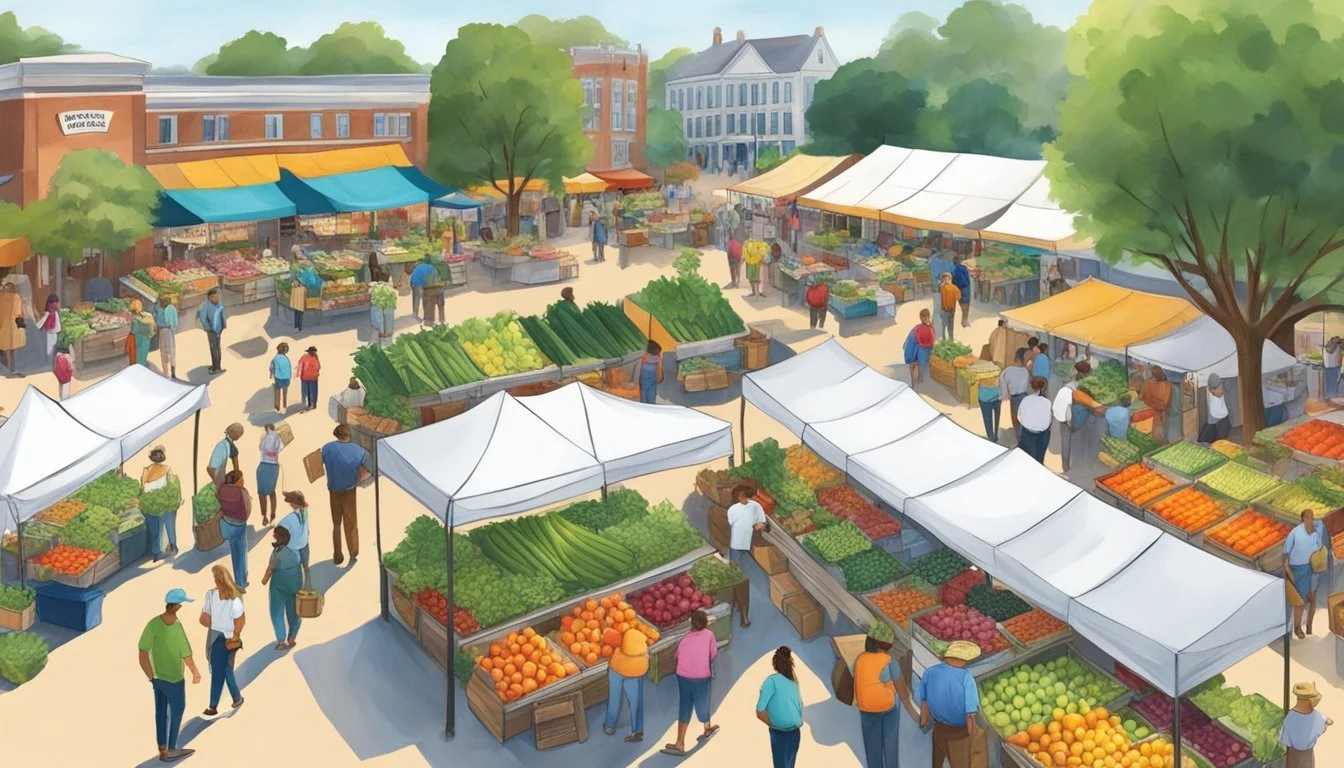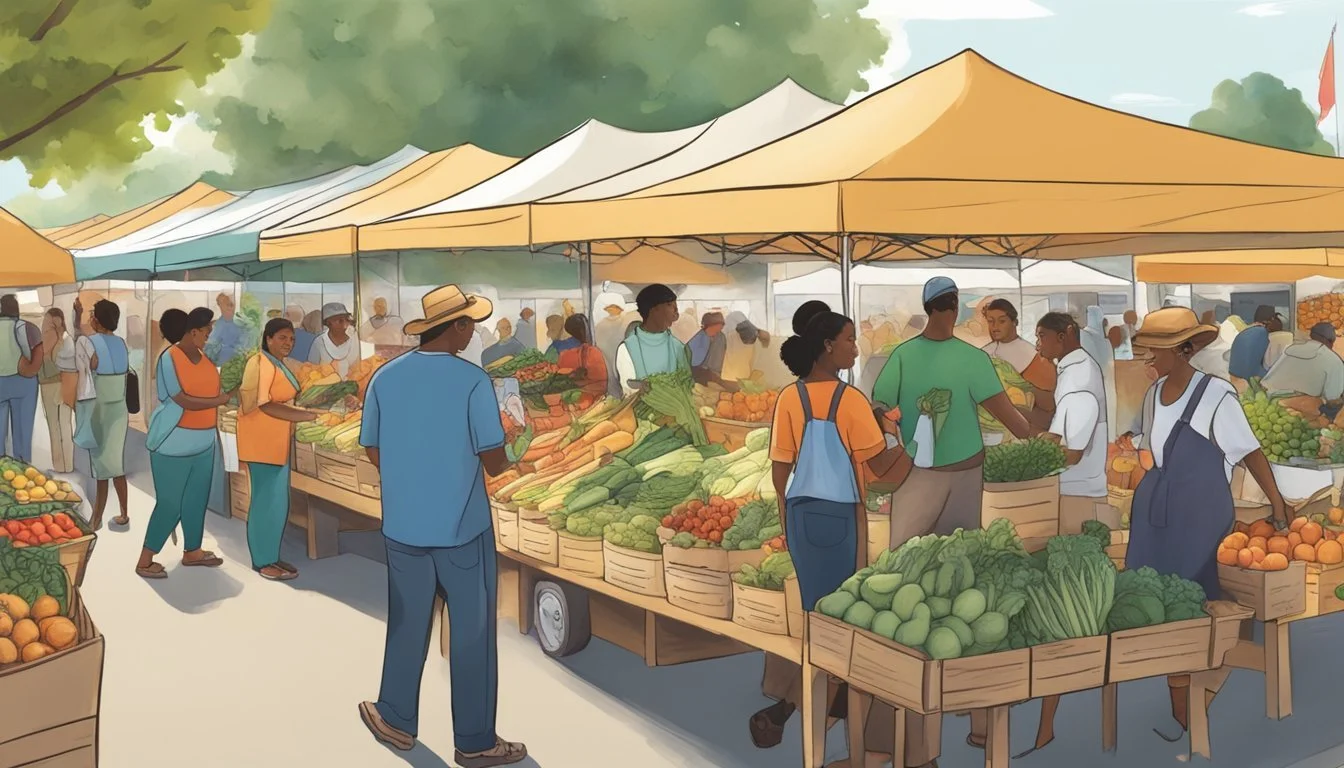Community Supported Agriculture (CSA) in Jackson, MS
A Guide to Local Farm Shares
Community Supported Agriculture, commonly known as CSA, is a model that connects local farmers directly with consumers, fostering a partnership that benefits the local economy and encourages sustainable agriculture. In Jackson, Mississippi, this concept has taken root, offering residents a way to purchase fresh, locally-grown produce while supporting area farmers. Through weekly or bi-weekly shares of the harvest, consumers enjoy a variety of seasonal vegetables, fruits, and sometimes additional farm products, which are often organic or sustainably grown.
CSA programs in Jackson provide a direct link between the community and the farming process. Residents sign up for a subscription or membership with a local farm, such as Two Dog Farms in nearby Flora, which in turn delivers a regularly scheduled box of farm products during the growing season. These programs also often provide options for members to personalize their shares with “Add-Ons” or to purchase different sizes of farm boxes to accommodate individual or family needs.
Local food directories play an important role in connecting consumers to these CSA opportunities. They act as a resource where one can find detailed information about different CSA providers, pickup locations, product offerings, and subscription guidelines. Such directories help community members in Jackson, MS, easily locate and support local farmers, enriching the farm-to-table experience. With benefits ranging from fresher food with a lower carbon footprint to the strengthening of the local agricultural community, CSA is a seminal part of Jackson’s commitment to sustainable living and community wellness.
The CSA Concept
Community Supported Agriculture (CSA) in Jackson, MS represents a symbiotic union where consumers and farmers foster a shared commitment to local, sustainable agriculture through subscription-based partnerships.
History and Philosophy of CSA
Community Supported Agriculture, or CSA, has its roots in the cooperative movement of the 1960s and 1970s, emerging as a formalized concept in the United States in 1985. It introduced a new approach, where the risk, rewards, and responsibilities of farming are shared between the consumers and the farmers. Pioneered by Robyn Van En, CSA began as a simple idea in Massachusetts and rapidly gained traction, encapsulating a philosophy set on sustainability, food security, and a direct, fair relationship with the land.
How CSA Benefits the Community
CSAs cultivate a tight-knit framework that provides significant benefits to communities, including Jackson, MS:
Local Economy: CSAs inject capital directly into the local economy, sustaining farms and creating agricultural jobs.
Freshness and Health: Consumers receive a supply of fresh, often organic produce that surpasses typical grocery store freshness.
Environmental Impact: Sustainable farming practices, inherent to most CSAs, contribute to decreased agriculture-related pollution, soil health, and biodiversity.
Educational Opportunities: By connecting customers directly to their food sources, CSAs often educate the public about farming and seasonal eating, fostering a knowledgeable community base.
Understanding CSA Subscriptions
A CSA subscription is a financial agreement that goes beyond the transactional. The consumer pays in advance for a "share" of the season's harvest from a local farm. This share typically consists of a weekly or bi-weekly box of vegetables, but can also include other farm products. The subscription model achieves two goals:
It secures a stable, upfront income for the farmer.
It provides consumers with a regular supply of fresh, locally-grown produce.
Subscribers often enjoy additional perks such as newsletters, recipes, or invitations to farm events, enhancing the sense of community integral to the CSA model.
Local CSA Farms
Community Supported Agriculture (CSA) is a thriving concept in Jackson, MS, where members of the community can subscribe to receive season-fresh produce directly from local farms. These CSA programs not only encourage sustainable agriculture but also foster a closer connection between farmers and consumers.
Identifying CSA Farms in Jackson, MS
In Jackson, MS, individuals can locate CSA farms through various platforms. LocalHarvest remains a prominent resource; it lists CSA farms like Hopes Produce and Emporium, which has been serving the community with fresh, locally grown produce since 1975 originally under the name Hidden Acres Ranch. Subscribers to these farms can enjoy a range of products including vegetables, herbs, flowers, and more, depending on the farm's offerings.
Types of Farms Participating in CSA Programs
Several types of farms around Jackson engage in CSA programs. These typically include:
Diverse vegetable farms: Offering a variety of seasonal vegetables throughout the harvest months.
Herb and flower growers: Some farms may specialize in or also provide aromatic herbs and beautiful flowers.
Orchards and tree farms: Subscribers can receive fruits or even plants and trees in their CSA shares from these farms.
The CSA model is applied by farms of various specialties to provide fresh, local products directly to their subscribers.
LocalHarvest and CSA Directories
The most reliable way to connect with a CSA farm near Jackson, MS, is through the LocalHarvest directory. This comprehensive list includes farms or associations that deliver regular shipments of local farm products to subscribers. For example, Two Dog Farms informs prospective members of their spring CSA season timings and pickup locations through their listing, confirming transparency and accessibility for potential members. It's critical for consumers interested in CSA to check such directories to find the most updated information on local CSA options.
Joining a CSA
Community Supported Agriculture (CSA) in Jackson, Mississippi, provides consumers a meaningful way to invest in local agriculture, obtain fresh produce, and support area farmers. When considering a CSA membership, potential members should assess the commitment required, understand the fees involved, and evaluate which CSA best fits their family's needs.
How to Become a CSA Member
To become a CSA member, individuals should first locate area farms that offer CSA programs, often found through local directories or agriculture networks. Interested consumers may directly contact these farms or visit their websites to gain information on availability. Upon finding a suitable CSA, one typically signs up by completing a membership application and agreeing to the terms of the share.
Steps to Membership:
Identify local CSA programs in Jackson, MS.
Contact the farm to inquire about openings.
Complete an application form.
Agree to the CSA's terms for the season.
Understanding CSA Membership Fees
Membership fees for a CSA are essentially prepayments for a season's worth of agricultural products. These fees can vary significantly depending on the farm's offerings, the duration of the CSA season, and whether additional farm products are included beyond vegetables. Fees are usually structured on a per-share basis, making it vital for potential members to review payment terms, refund policies, and what the share includes.
Typical Payment Structure:
Cost per share: An upfront sum covering a season's produce.
Payment options: Some CSAs offer installments.
Refund policy: Varies by farm; should be reviewed before agreement.
Selecting the Right CSA for Your Needs
Selecting the right CSA is critical and requires considering various factors such as pick-up locations, types of products offered, and share sizes. Farms like Two Dog Farms in the Jackson area may provide different pick-up options and add-ons like freshly baked sourdough. Consumers should review the farm's product range to ensure it aligns with their dietary preferences and family size.
Considerations for Selection:
Pick-up options: Accessibility and convenience of pick-up locations.
Product range: Variety and types of products included in the share.
Share size: Suitability of the share quantity for one's household.
Seasonal Produce and Offerings
Community Supported Agriculture in Jackson, MS offers a way for consumers to access fresh, nutritious food by purchasing shares of a farm's harvest. Here, seasonal produce takes center stage, supporting the local economy and fostering a connection between the farm and the community.
What to Expect in CSA Shares
CSA shares in Jackson typically include a weekly or bi-weekly box of fresh vegetables, which may be supplemented with other farm products like fruit, eggs, and flowers. For instance, during the spring season starting the week of April 22nd, one can expect an array of spring vegetables like leafy greens and radishes. By purchasing these shares, individuals receive a direct supply of high-quality produce grown in the rich soils of local farms.
The Role of Seasonality in CSA
Seasonality is fundamental to CSA programs as it dictates the variety of produce available in shares. In Jackson, the spring and summer months bring an abundance of zucchini, tomatoes, and peppers, while the cooler fall weather makes way for squash, carrots, and potatoes. These cycles ensure that subscribers receive the most flavorful and nutritious food at the peak of its freshness.
Diversity of CSA Farm Products
While vegetables are the backbone of CSA shares, the offerings are diverse and often extend beyond just greens. Many farms intersperse their selections with a host of other products:
Fruit: Berries, apples, and melons during their respective seasons.
Eggs: Often available from free-range chickens and valued for their freshness.
Flowers: Seasonal blooms that bring color and life to one's home.
Herbs: Aromatic additions for cooking, like basil and thyme, often feature in CSA shares.
This variety not only enriches the culinary experience but also supports the ecosystem of the local farms, promoting sustainable agricultural practices.
CSA Operations and Logistics
Community Supported Agriculture (CSA) in Jackson, MS, operates through a harmonized system connecting producers and consumers with a focus on local foods. Efficient management of production, distribution, and adjustment to seasonal variations is crucial for CSA success.
Managing CSA Production and Distribution
In Jackson, producers manage CSA operations by carefully planning crop production to meet the demands of their members. Data plays a significant role in forecasting how much to plant and when to harvest. Farmers utilize production schedules aligned with the seasons to ensure varied and consistent offerings in CSA shares. Market managers often employ an API to integrate share availability and manage member subscriptions seamlessly.
CSA Pickup Locations and Processes
CSA pickup locations are strategically selected for member convenience. For instance, weekly CSA boxes might be available for pickup Tuesday from 4pm to 6pm at The Farm Store in Flora. Members typically receive notification of pickup times and locations, ensuring they know when and where to collect their produce. This process emphasizes a commitment to streamlined logistics and community engagement.
Impact of Weather and Seasons on CSA Operations
Weather and seasons play a pivotal role in the viability of CSA operations. Adverse weather conditions can affect production, leading to adjustments in the quantity and variety of produce available. CSA producers must communicate potential changes to members swiftly, often through direct alerts. They also plan for seasonal variations to anticipate and mitigate disruptions in the supply chain.
Supporting Local Agriculture
In Jackson, Mississippi, Community Supported Agriculture provides a direct link between local farmers and consumers, fostering a stable market for locally produced food and promoting sustainability.
Advantages of Supporting Local Farmers
Economic benefits: Consumers in Jackson participate in CSA programs which involve purchasing shares of a farm's harvest. This pre-season financial support helps farmers plan and manage their operations effectively, ensuring a stable income stream and reducing the financial risks associated with farming.
Community impact: Funds stay within the local economy, contributing to its strength and resilience.
Freshness and flavor: CSA members receive a weekly supply of fresh, locally grown farm products, which are often harvested within 24 hours of delivery.
Promoting Sustainable Farming Practices
Sustainable agriculture is a core tenet of many CSAs in Jackson. Farmers are encouraged to use environmentally friendly methods that preserve the quality of the soil and minimize water usage.
Reduced carbon footprint: Local agriculture significantly reduces the need for long-distance transport, lowering greenhouse gas emissions.
Protection of biodiversity: Local farmers often grow a variety of crops, fostering genetic diversity and healthy ecosystems.
Connecting with Local Food Systems
Community Supported Agriculture creates a tangible connection between Jackson residents and the local food system. Members learn where their food comes from and gain insight into the farming process, which promotes a greater appreciation for sustainable practices and the challenges farmers face.
Educational opportunities: Many CSAs offer farm visits and participative events, enhancing the understanding of agricultural processes.
Seasonal diet: CSA members adapt to eating seasonally, which supports the natural production cycle and reduces dependency on imported goods.
Community Supported Agriculture in Jackson exemplifies a successful model of local agriculture, where consumers have access to sustainable, fresh produce while supporting the livelihoods of local farmers.
Consumer Guidance and Tips
When joining a Community Supported Agriculture (CSA) in Jackson, MS, consumers receive fresh, seasonal produce directly from local farmers. It’s a partnership fraught with mutual benefits and responsibilities. Here’s how to navigate and make the most of your CSA membership.
Maximizing Benefits from CSA Membership
Members have the unique opportunity to forge a direct relationship with the agriculture community. To maximize benefits from a CSA membership, they can:
Pick-up Locations: Ensure you're aware of the CSA pick-up locations and schedule. Staying on top of this guarantees you get your full share of fresh produce.
Communication: Engage with your CSA farmer. Feedback can lead to improvements and farmers often share tips on how to best use your share.
Tips for Cooking with Seasonal Produce
Cooking with seasonal produce can be both exciting and intimidating. Here are a few strategies:
Recipe Flexibility: Embrace substitution in recipes to accommodate for the seasonal produce in your share.
Preservation Methods: Learn canning, freezing, and drying techniques to extend the shelf-life of your produce.
Handling Limited Availability and Variety
CSA shares vary, and sometimes you might face limited availability or variety:
Creative Cooking: See limited variety as a culinary challenge, not a setback. Utilize different cooking methods like grilling, roasting, or sautéing.
Community Engagement: Swap items with other CSA members to diversify your produce intake. This nurtures a sense of community and shared experiences.
Beyond Produce
Community Supported Agriculture in Jackson, MS offers more than just fresh fruits and vegetables. Local CSAs are expanding their shares to include a variety of animal products and non-produce items, meeting the growing consumer demand for wholesome, locally sourced food.
Including Animal Products in CSA Shares
CSA shares in Jackson often incorporate animal products to provide a more complete and nutritious offering. These shares tend to include eggs from pasture-raised chickens, ensuring that subscribers get access to high-quality protein sources. Additionally, some CSAs partner with local dairies to offer artisanal cheeses made from the milk of cows or goats that are raised in a sustainable manner. Customers appreciate the transparency and ethical treatment of animals involved in producing these items.
Eggs: Typically from chickens allowed to forage outdoors.
Cheese: Can vary from soft, fresh varieties to aged hard cheeses.
CSA Options for Non-Produce Items
Beyond protein, CSAs are diversifying their shares with a range of non-produce items that complete the local food experience. Shares may encompass goods such as freshly baked sourdough bread, cultivated from local grains and baked by community artisans, or value-added products like jams and pickles made from the farm's own produce. Herbal teas and flowers are also common, reflecting the agricultural diversity of Jackson's farms.
Bakery Items: Sourdough and other local bakery goods.
Value-Added Products: Jams, pickles, and similar preserved items.
Herbal Teas & Flowers: From the farm's herbal garden or wildcrafted locally.
Frequently Asked Questions
What is a CSA?
A Community Supported Agriculture (CSA) program is a partnership between local farmers and consumers. Members buy shares of the farm's harvest in advance, providing the farmer with upfront capital for the growing season.
How does CSA membership work?
Members pay for their shares at the beginning of the season either in a lump sum or installments. This investment entitles them to a portion of the farm's produce throughout the season.
What are the benefits of joining a CSA in Jackson, MS?
Members receive fresh, locally-grown produce weekly. They also foster a direct relationship with the farm and contribute to local food systems' sustainability.
How do I pick up my CSA shares?
Pick-up options vary. In Jackson, MS, some farms offer specific locations and times for weekly pick-ups, such as at farm stores or designated community spots.
Can I choose what goes into my share?
Typically, the contents of each CSA share are determined by the week's harvest and are therefore seasonal and farm-specific. Some CSAs may allow for preferences or exchanges at pick-up points.
Term Definition Share A portion of the farm's harvest for the season Membership The act of joining a CSA program, usually through purchasing a share Local Produce that is grown and distributed within a specific geographic area
Remember, by joining a CSA, members actively support local agriculture and receive fresh produce throughout the farming season.

